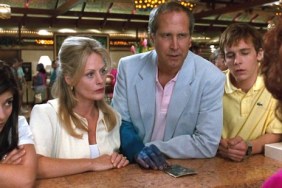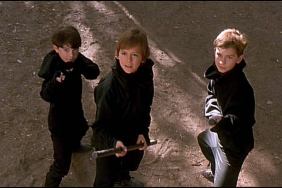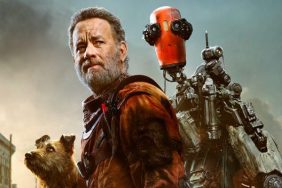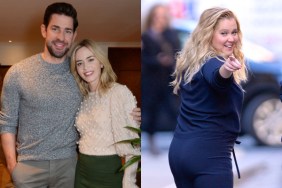
CraveOnline: John Francis Daley and Jonathan Goldstein said they wrote a stop at mom and dad’s house. Was that the version you read?
Beverly D’Angelo: Yeah, did you read it?
No, but I’ve gotten to talk to them.
Yeah, that was it and when I read it, I called Chevy, I said, “Have you read it yet?” He goes, “I don’t know.” I said, “Read it and then call me back.” I said, “Do you realize the way that they popped in on us, we could answer the door in towels or smoking a joint, just insane. We just could have gone berserk in the meantime. There’s some freedom here.“ He was laughing but we haven’t gotten to that state. We’re certainly not shooting it.
Could the rewrite be where mom and dad come along on the trip, and it’s more than a cameo?
I have no idea. Again, with your sophisticated input, that’s a possibility.
That would be great if the rewrite is you have a bigger part.
Look, let’s face it, if it’s going to be a Vacation movie, it’s gotta have Clark and Ellen. It’s certainly got to have Clark and you can’t have Clark without Ellen because Chevy isn’t Clark Griswold without me.
In your opinion could there have been one more after Vegas Vacation?
There was supposed to be one more after Vegas Vacation. I’m going to say it anyway but I think that the failing of Vegas Vacation is that the producers chose to take it out of the kind of parallel universe it had existed in and we were suddenly a real family in the real Vegas and there were real people from Vegas there, instead of having it be a parallel universe. For example, on the first one, the family could have gone to Disneyland but we didn’t. We went to Wally World. It was a parallel universe.
Where was the fifth Vacation going to be?
I don’t know. We talked about Griswold Family Robinson or something like that, I don’t know. I thought we should go to the moon. To Chevy once, I said, “I think we should get on that trip to the moon.” And he goes, “Yeah, and then we miss the bus back, the rocket ship back.”
Every franchise goes into space so it would be natural.
Yeah, there you go.
One thing I have always been curious about is they have never released the original ending of Vacation. I understand it won’t be as good because they reshot it for a reason but I would love to see the first version.
That’s interesting because we did shoot it, we had an original ending and in the original ending we go to Wally World, it’s closed, Clark buys a gun and then we go to Mr. Wally’s house and at gunpoint we make him perform. If you recall, Eddie Bracken, who played Mr. Wally, was a song and dance man for real. So they did a song and dance and then six months later I got called back. I was living in Italy at the time and I get called back. We were at Magic Mountain and John Candy was there. I said to the producer, Matty Simmons, “What’s the deal? Why are we doing this over?” He said, “Well, we need something that’s more in bad taste.” It was too tasteful.
There’ve been so many DVDs and Blu-rays but they’ve never put that ending on there.
Maybe it’s lost.
That would be a shame.
Yeah, it would be a shame because to see Eddie Bracken singing and dancing is something wonderful, but I think really maybe after all that, you really do want them to get to Wally World because you’ve got to remember if we hadn’t actually entered into Wally World, then the whole trip would have been for naught.
It’s a great ending. I’m just curious about the other ending now. Do you get to be in the Entourage movie?
I don’t know. I haven’t gotten a call. I’m going to start an online campaign. I wrote Doug [Ellin], I saw some article that they were greenlit. This was months and months ago and I wrote him, “Is Barbara dead? Did she die?” He just wrote back, “LOL.” So I don’t know. Maybe she had a heart attack or something.
You’ve been able to do these memorable movie cameos like Bounty Killer, like Harold and Kumar and like The House Bunny. Has that been a good place to be in?
Well, you know, I had kids.I have 12-year-old twins. I had kids really late after I’d kind of done everything twice, and then I became a single mom when the kids were three and their father works a lot. I just kind of looked at everything and I said, “You know, I can be an available parent.” I realized that meant that I couldn’t go out of town to work on films and that there wasn’t a lot of stuff that I could really do and be as available to the kids as I wanted to be. That’s affected things and it’s satisfying to be able to do what I’ve done, the way it’s worked out.
You worked with Tony Kaye again after American History X in the movie that never came out, Black Water Transit.
Yeah, we did a whole movie in New Orleans. Didn’t come out but Tony could be editing that for years.
I understand he wants to shoot more which might be difficult years later.
I wish he would because it’s a brilliant film and he’s a brilliant, brilliant man. That man is a total, total genius. He called me to do something in the last movie that he did with Adrien Brody and I couldn’t. It was a regret I wasn’t able to be available at that time. I’d do anything with him.
Have you seen Black Water Transit?
I saw parts of it. He e-mailed me parts of it. He used a lot of interesting effects and stuff too. He’s incredibly, incredibly creative. Laurence Fishburne, his kids went to the same school that my kids used to go to so we’d see each other dropping off or picking up kids and I’d say, “What about Black Water Transit?” He’d go, “Yeah, what about it?”
We’ve heard about the contentious stories about American History X. Did that turn out significantly different than the movie you thought you made?
That was a very interesting approach to filmmaking because Tony Kaye is not only the director but he’s the cinematographer and he’s the camera operator. So that allowed him a lot of freedom because he was right there holding the camera, setting up the shots and directing. That was actually shot on film so you have even more freedom now with the use of digital cameras but he was able to be incredibly flexible.
Edward Norton did a lot of writing while we were shooting. Sometimes I’d show up and I’d just get pages. Tony Kaye would shoot anything that anybody wanted to, for real. He even put $800,000 of his own money into it. He wanted to shoot more on that. He had a certain perspective on it but what was happening, Edward Norton had several films coming out. He had a lot of publicity that was oriented toward a film that was going to be released and he said, “Look, if we go with the cut that I like, I can throw that into it. I’ve got a cover on this magazine and that magazine.”
So they just kind of forged ahead. They didn’t really understand Tony’s vision. It was his first film so that’s what happened. The cut was not the director’s cut and it was not what he had ultimately envisioned as far as the true protagonist and antagonist and what he wanted to say, but I know that he went through a lot of changes with that and formed his perspective on what he could do as an artist in Hollywood. It affected his perspective on what he could do for a long time but in the meantime, he had made an amazing four-hour documentary on abortion called Lake of Fire.
He never stops working. He paints, he shoots, he writes. He writes music. He’s a brilliant musician. He’s really, really, really something. If I ruled Hollywood I would just call him up and say, “What do you want to do?”
I just want to touch on a few more movies before we go. I imagine Hair was significant to you and Every Which Way But Loose was another comedy.
Hair was really significant. I came to New York because I was starring in a Broadway musical. It was part of a really small repertory company I was in in Canada. It was one of those stories where a producer saw me and said, “Fire everybody but that girl.” Boom, I was starring on Broadway. It closed right away. I got a Screen Actors Guild card with a couple lines in Annie Hall courtesy of Woody Allen and then I had many auditions for Hair because I was also in love with Milos Forman at the time so I think the 14 auditions had to prove to everybody that it wasn’t just because he liked me. My entree into acting was really singing my way into it.
And Every Which Way But Loose, I didn’t meet Clint Eastwood until I was on the set in a scene because I had made a TV movie called First Love and he’d seen that because his agent was married to Susan Dey who starred in it. That was just an out and out offer. That was Clint Eastwood. He was just that kind of a guy. He saw something he wanted and he said, “Boom, you’re in” and that was that. In fact, I went from Hair directly into Every Which Way But Loose. I had no idea what I was getting into but it was fantastic and really wonderful to work with Clint Eastwood at that part of his life.
Until Every Which Way But Loose, he was a star but that really was such a huge success and it opened the door to another facet of his life. He wasn’t the squinty eyed cowboy smoking a cigarillo. He was more user friendly. He was funny.
Well, that’s our time. Thank you for this conversation and talking about all these films.
And thanks for asking about American History X and Tony Kaye. I could talk about him all day long.
Oh, you’re welcome. That footage has never come out either, the other versions of American History X.
No, no, no, the extra stuff he shot is in the movie. He shot whatever Edward wanted to shoot.
But what was cut we haven’t seen.
Stuff was cut and stuff that he wanted to shoot was not included.
Anyway, he’s come around on that too. He’s given the film his okay.
Yeah, but I mean, he’s brilliant. He’s the real deal and it’s unfortunate that there isn’t a lot of room for him.
Well, I loved Detachment and I’m hoping we get to see Black Water Transit someday.
Some day.
Fred Topel is a staff writer at CraveOnline and the man behind Shelf Space Weekly. Follow him on Twitter at @FredTopel.








